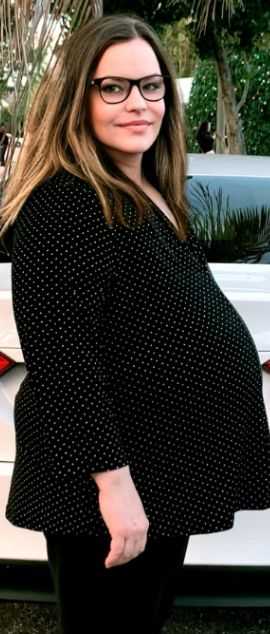
The author in 2019 after undergoing surgery for breast cancer.
“Congratulations. When are you due?” a woman asked me as I pumped gas.
“Oh, I’m not,” I said.
She gave me a confused look.
“I had breast cancer,” I told her.
“Oh, my God! I’m so sorry,” she said, shocked. “God bless you.”
I’m not sure why I offered her an explanation. I think I was also in shock. That was the first time since I’d had a double mastectomy that someone mistook me for being pregnant.
A wave of grief came over me as I remembered the twins I lost nearly a decade earlier. I was over 35 when I conceived, and my pregnancy was considered high-risk. Still, no matter the odds, I wanted to celebrate, and I told everyone I was expecting.
The pregnancy was difficult, and I miscarried at 14 weeks. Before I lost the babies, other parents shared lots of advice and stories about their own pregnancies and kids, and I was thrilled to be a part of that world.
After the pregnancy loss, I learned I would never be able to have children. I seriously considered adoption, but it wasn’t an option due to my financial situation at that point in my life. It made me wish I had given more thought to family planning in my 20s. Now it was too late, and the sorrow from losing the twins and from being told I would never be a mother hit me hard.

I found a therapist who helped me work through my grief, and, with the help of a mindfulness practice, I began to find joy in spending time with and giving to the children who were in my life. I started to enjoy how things were instead of how I wished they were.
Eight years later, I was diagnosed with breast cancer, and my world changed again. I moved back to Florida, where I had not lived for 15 years, to be closer to my family. I underwent a double mastectomy, and it took a year and a half for the wounds to fully heal.
It wasn’t long after my surgery that strangers began to assume I was pregnant due to the combination of my now flat chest and the shape of my stomach. Some, like the woman at the gas station, asked when I was due. My neighbor offered a huge smile as he pointed at his stomach and then mine and shouted, “Congratulations!” There have been several occasions when I’ve gotten dirty looks from people when they see me drinking. I find myself explaining to them that it’s OK if I have a glass of wine because I’m not pregnant.
Unfortunately, strangers feel entitled to ask women about their bodies or their plans to have children. When I was a teacher, parents were constantly asking me if I had kids of my own. I always had an answer ready — “one day” or “when the time is right” — in hopes of moving the conversation in a new direction. It was unpleasant, but I made do. However, after losing my twins and having a double mastectomy, these inquiries hit much differently. They felt insensitive and cruel, and even though the people asking me had no idea what I’d been through, the fact that they felt comfortable making assumptions about my life based on my body was unfathomable to me.
Sometimes when someone congratulated me, I would start to cry, and they would walk away confused. Other times I would angrily respond, “I’m never due.” These interactions just made me want to retreat from the world.
I knew I needed to find a way to deal with these experiences, so I began therapy again and worked on being confident in my responses to these strangers. Once, when a woman asked me if I was pregnant, I told her I had breast cancer. She was shocked, but instead of walking away from her, I waited to see what she thought about my response. She told me about her sister, who was also battling breast cancer, and I gave her some guidance.
Another person held a door open for me at a store and said, “You two first.”
“Oh, no, it’s just me,” I told him.
“I’m so sorry, ma’am,” he responded.
“I’m just happy to be alive. I had breast cancer, not a baby. It’s OK,” I replied. He gave me a look that signaled he didn’t believe me, so I offered a smile and added, “But you really shouldn’t comment on someone’s appearance because you never know what’s going on with them.”
I came to realize the comments weren’t so much about me as about our appearance-obsessed society and how we’ve been conditioned to think about what women should want for their lives. Though people may mean well, their comments can be judgmental and hurtful, and they don’t even realize it.
Having to constantly be reminded of the pain of miscarrying two babies I wanted and that my body doesn’t look the way it’s “supposed to” has been torture. It threatened to turn me into a recluse who rarely left home or, when I did, might burst into tears or a rage. I didn’t want to live that way, and I don’t want anyone else to live that way either.
I also didn’t want to punish people who truly believed they were being friendly or trying to connect with me. We need more connections, not less. But we should always go into every interaction assuming that we don’t know what the other person is grappling with and approaching them with kindness and compassion.
Hopefully, we can all be more mindful of our comments and be more respectful of each other’s hidden struggles. As I plan for the reconstruction of my chest, I’ve decided to see every encounter I have as a chance to help make the world a kinder place. I hope you’ll join me in doing the same.